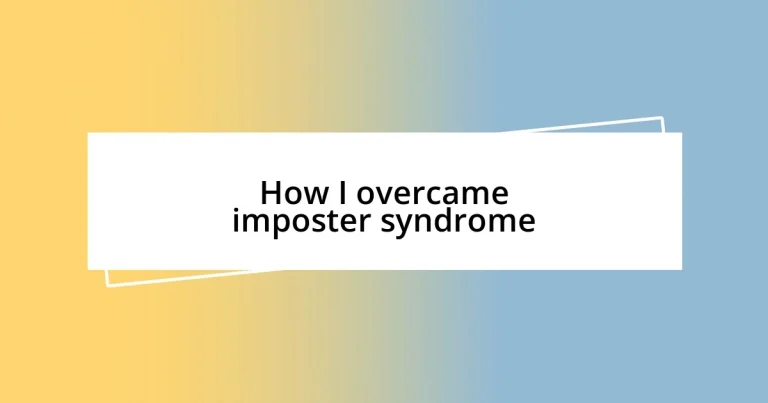Key takeaways:
- Recognizing the commonality of imposter syndrome among high achievers helps dismantle feelings of inadequacy.
- Transforming negative self-talk into positive affirmations significantly enhances self-confidence and perception of capabilities.
- Building a support network and sharing experiences with others are crucial for overcoming feelings of isolation and self-doubt.

Understanding imposter syndrome
Imposter syndrome is that nagging feeling of self-doubt and inadequacy that creeps in, often despite evident success. I remember when I landed my first major promotion; instead of feeling proud, I asked myself, “Am I really qualified for this?” This internal dialogue can be exhausting, making us question our abilities even in the face of accomplishments.
Emotionally, imposter syndrome can be isolating. It’s tough to admit when you feel like a fraud, especially in environments where everyone else seems confident. There were moments I would look around the room during meetings, wondering if everyone else was just as insecure as I felt. Have you ever sat in a group, feeling utterly out of place, convinced that your peers were far more capable? It’s a sentiment that many experience but few openly discuss.
Understanding that imposter syndrome is common among high achievers is crucial. During my time at a conference, I overheard a seasoned leader share her own struggles with feeling like a fraud. It was a revelation for me—knowing that even those I admired faced similar insecurities. Acknowledging this collective experience can be a powerful step in dismantling the barriers that hold us back.
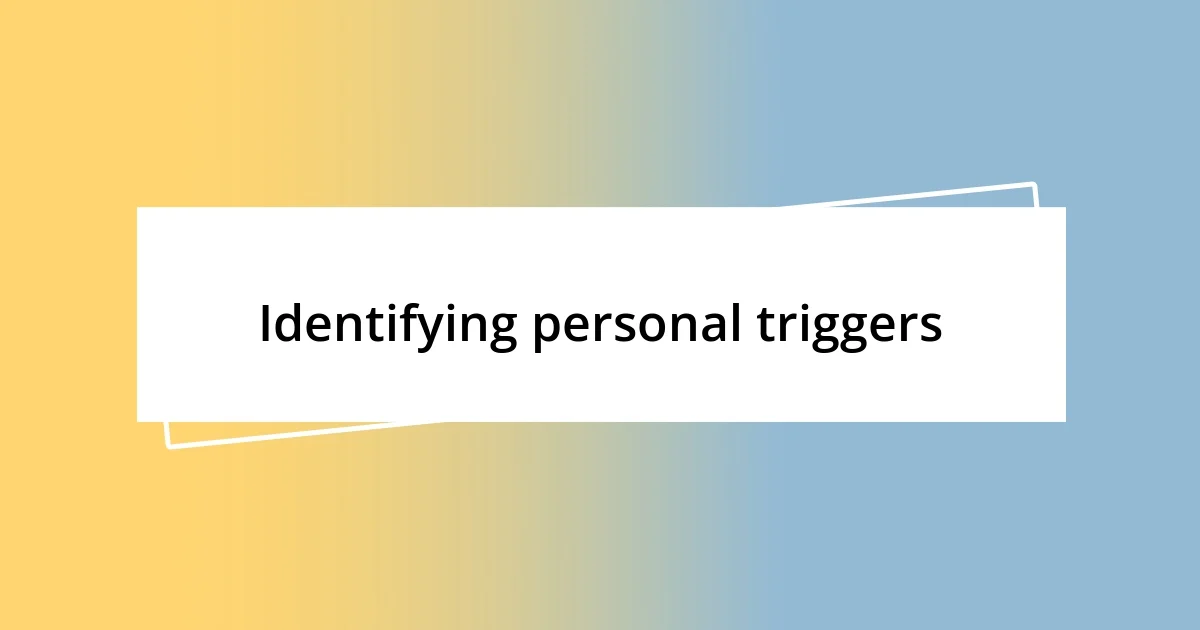
Identifying personal triggers
Identifying personal triggers is a vital step in managing imposter syndrome. For me, it became clear that certain situations would amplify my feelings of inadequacy. I noticed that when I was praised publicly or faced new challenges, those old doubts resurfaced, often in the form of “Do I really deserve this recognition?” Recognizing these patterns allowed me to prepare better for those moments.
Here are some common triggers that might resonate with many:
- Social Comparison: Scrolling through professional social media and comparing achievements can ignite self-doubt.
- New Responsibilities: Stepping into a new role or project can bring about uncertainty.
- Unexpected Praise: Receiving compliments unexpectedly can lead to feelings of unworthiness.
- Negative Feedback: Criticism, however constructive, often makes me second-guess my abilities.
- High Stakes Situations: Presentations or critical meetings can make me hyper-aware of my perceived flaws.
Becoming aware of these triggers has been instrumental in my journey. By understanding when and why I feel vulnerable, I can build strategies to combat those feelings and embrace my accomplishments instead.
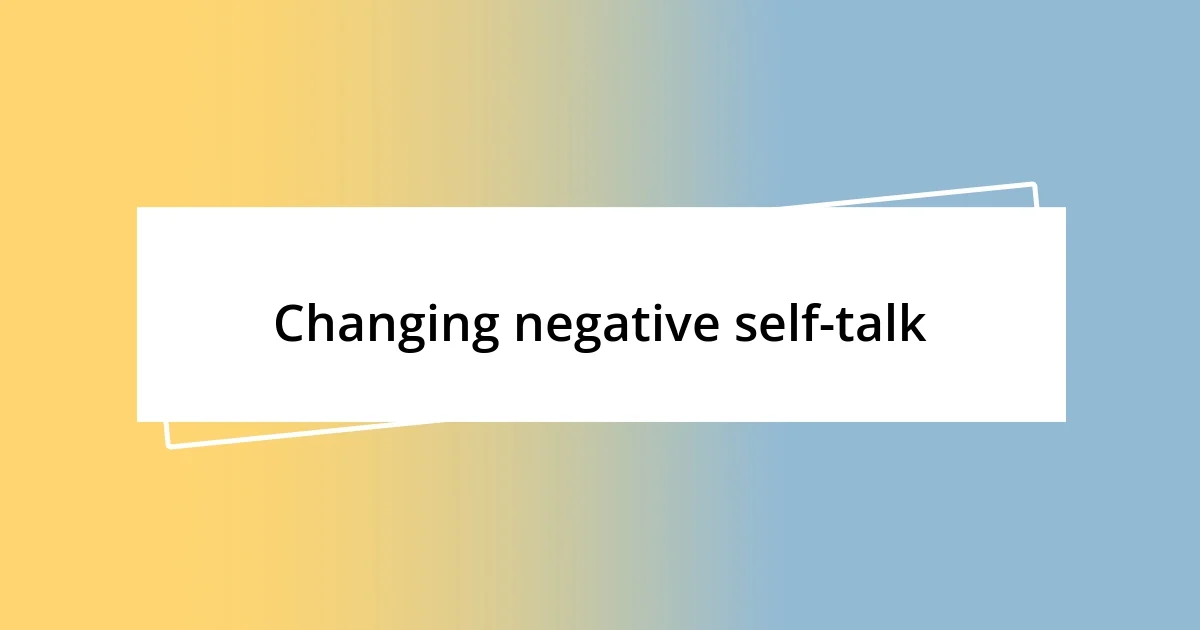
Changing negative self-talk
Changing my negative self-talk was truly transformative. Initially, I didn’t realize how detrimental my inner voice could be. I caught myself thinking things like, “I’m not as skilled as others,” even when my results spoke for themselves. Gradually, I learned to challenge these thoughts. Instead of accepting them as facts, I began to ask myself: “Is there evidence for this belief?” This simple question shifted my perspective and encouraged a more realistic self-assessment.
I found that replacing those negative statements with positive, affirming ones redefined my self-image. For instance, I started reciting affirmations like, “I am capable and worthy of success.” This practice felt strange at first; staring at myself in the mirror and declaring these facts felt almost silly. But over time, it fostered a new level of confidence. Have you ever noticed how a shift in words can change your mood entirely? It’s impressive how adjusting my internal dialogue has impacted my day-to-day feelings and interactions.
A noteworthy moment for me was during a team project presentation when I noticed that my thoughts began spiraling: “What if I mess up?” I consciously halted that cycle and instead reminded myself of my preparation and contributions. By focusing on my strengths, I gathered the courage to express my ideas. The applause from my teammates felt validating, reinforcing that my new mindset truly works. Changing negative self-talk isn’t just a concept; it’s a necessary action that can fuel our growth.
| Negative Self-Talk | Positive Self-Talk |
|---|---|
| I don’t belong here. | I have earned my place here. |
| I’m not good enough. | I have unique skills to offer. |
| Everyone is better than me. | I can learn and grow from others. |
| My success was just luck. | I worked hard for my achievements. |
| I’ll fail if I try. | I have the ability to succeed. |
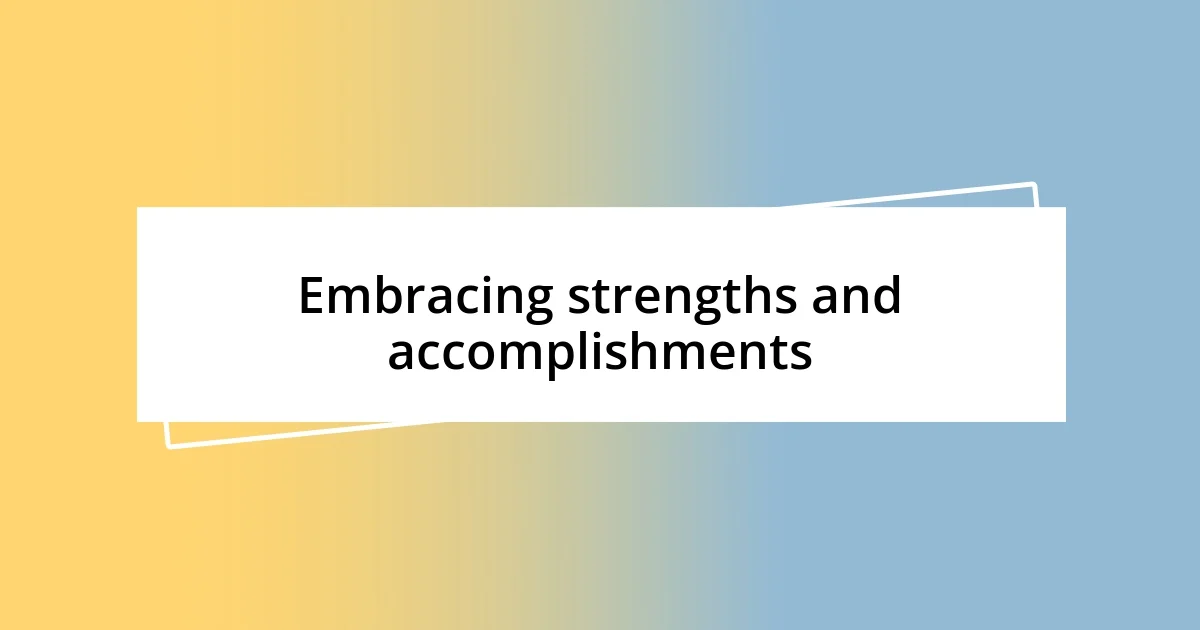
Embracing strengths and accomplishments
Embracing my strengths was a game changer for me. I used to brush off my achievements, thinking they weren’t that significant. But then I started actively acknowledging my successes, no matter how small they seemed. One day, I looked back at a project I led and realized it not only went well, but my team thrived under my guidance. How often do we overlook our ability to inspire others? Recognizing my impact helped bolster my self-worth, reminding me that I had something valuable to offer.
Reflecting on my accomplishments didn’t just serve as a confidence booster; it became a powerful practice. After a particularly challenging quarter at work, I created a visual board that highlighted my milestones. Each item represented not just what I had done, but the effort I had put in. It was a tangible reminder that my abilities were real and worthy. I often wondered: what if more people took a moment to celebrate their victories? Celebrating our individual journeys can be a profound affirmation of our capabilities.
There was a moment during a review meeting when my manager praised my strategic decision-making. Instead of downplaying it as luck or a team effort, I took a breath and accepted the compliment wholeheartedly. I remember feeling a wave of warmth wash over me. It was as if I was finally giving myself permission to accept that I belonged there. I believe many of us hold back from embracing our strengths, but when I started to own my achievements, it transformed not only my self-perception but also my contributions at work. Wouldn’t it be amazing if we all could step into our power like that?

Seeking support from others
Seeking support from others can make a world of difference when grappling with imposter syndrome. I remember reaching out to a mentor during a particularly tough phase at work, feeling overwhelmed by self-doubt. To my surprise, she shared her own experiences—she’d faced similar feelings in her career. It was comforting to know that even someone I looked up to had moments of uncertainty. Do you have someone in your life who has been vulnerable about their struggles? That kind of sharing fosters deeper connections and helps break the isolation we often feel.
Additionally, I found solace in peer support groups. Engaging with others who understood what I was going through created a safe space to express my fears and anxieties. I recall a meeting where one colleague shared her coping strategies, and it clicked for me. Her stories reminded me that I wasn’t alone in my feelings. Have you ever considered how sharing burdens can lighten the load? I began implementing some of her techniques, and they significantly improved my mindset.
What truly amazed me was the power of community. I joined an online forum focused on professional development, where members openly discussed their imposter feelings. One day, I shared a moment of anxiety I had during a conference call. The flood of encouraging responses helped me realize that we all face similar challenges. It made me think: how often do we underestimate the strength we can derive from collective experiences? Building a support network isn’t just beneficial; it’s essential for overcoming those nagging feelings of not being “enough.”
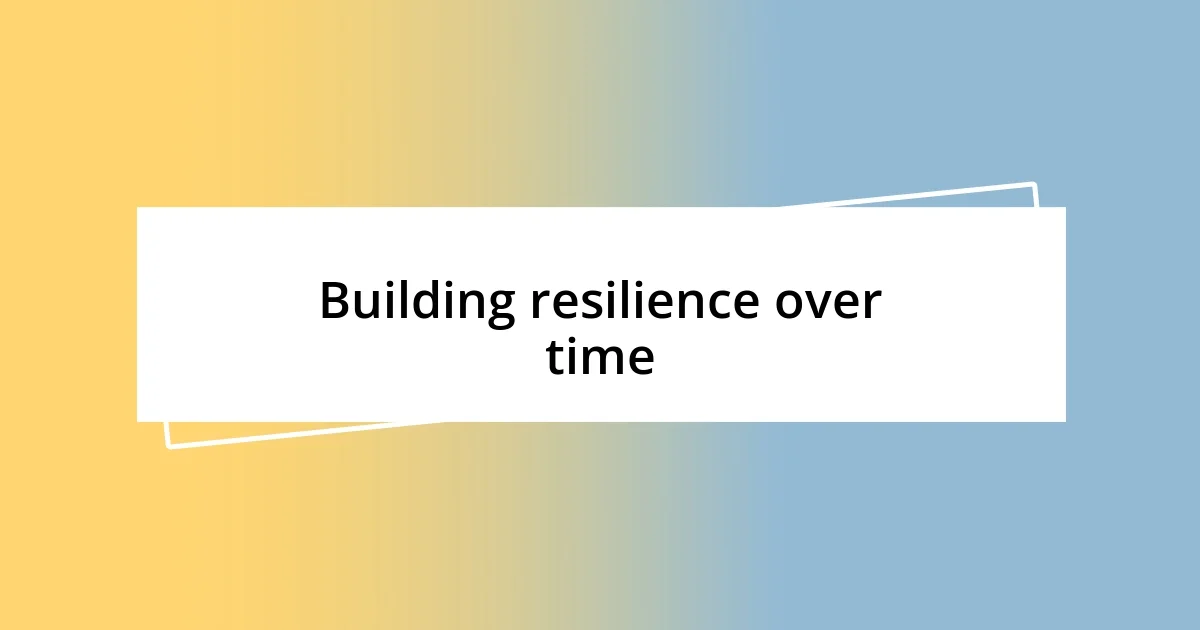
Building resilience over time
Building resilience is a journey, not a destination, and I’ve learned that it often unfolds gradually. I vividly recall a time when I faced a huge setback after a project I poured my heart into didn’t meet expectations. Initially, I felt crushed and filled with self-doubt. Yet, in that vulnerable moment, I chose to reflect instead of retreat. I started journaling about what went wrong and identifying the lessons learned. Each entry became a stepping stone, guiding me to see these experiences as opportunities, rather than failures.
As time passed, I began to embrace the idea that resilience is about adaptation. I remember feeling anxious before a public speaking event—my heart raced, and my hands were clammy. But instead of shying away, I focused on preparation and self-care. I visualized success and reminded myself of past accomplishments. Each successful presentation strengthened my confidence, creating a cycle of resilience. It makes me wonder: how often do we underestimate our capacity to grow from discomfort?
I’ve also discovered that resilience thrives in moments of vulnerability. There was a networking event where I hesitated to share my feelings about imposter syndrome, fearing judgment. But after taking a deep breath, I opened up. The feedback from others was overwhelming and supportive. I remember one woman saying, “You’re not alone; I feel the same way!” This open dialogue not only fortified my resilience but also connected me to a community of like-minded individuals navigating similar challenges. Isn’t it profound how sharing our struggles can transform both ourselves and those around us?
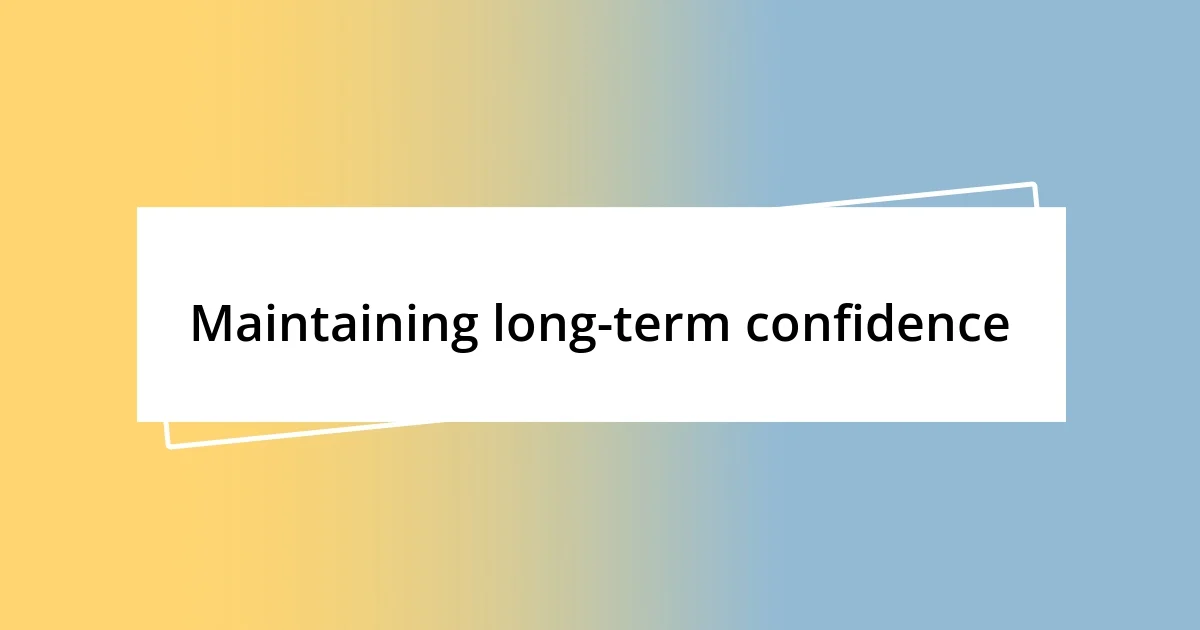
Maintaining long-term confidence
Maintaining long-term confidence requires consistent self-reflection and small, daily actions. I remember a phase in my career when every new challenge felt like a mountain I couldn’t climb. It took a conscious shift in perspective—rather than solely celebrating big wins, I started to recognize the significance of my day-to-day accomplishments. Have you ever stopped to acknowledge those little victories? They truly add up over time and serve as tangible reminders of your capabilities.
Another crucial aspect for me has been setting realistic goals. Early on, I was prone to creating lofty objectives that often left me feeling defeated. Then, I learned about the power of breaking goals into manageable steps. For instance, during a particularly demanding project, I divided tasks into daily to-dos. This not only kept me focused but also provided a constant stream of confidence boosts as I checked them off. It’s fascinating how progress, however small, can build a solid foundation for self-assurance.
Lastly, I’ve found that maintaining a growth mindset contributes immensely to sustaining confidence. There was a time when I received critical feedback that stung. Initially, I felt my confidence wavering; however, I soon shifted my inner dialogue to view feedback as an opportunity to learn. I began asking myself, “How can I grow from this?” This approach encourages an adaptable mindset, making it easier to bounce back from setbacks. Isn’t it empowering to realize that every challenge can lead to growth? Embracing that idea has strengthened my confidence, showing me that even in the face of uncertainty, there’s always an opportunity to evolve.












